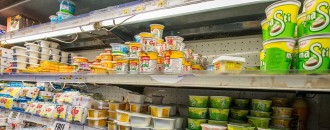
Indias food grain output to record 275.68 MT in 2016-17
The Dollar Business Bureau With good monsoon rains and various policy initiatives by the Government, India’s overall production of food grain to be increased by 2.3 million tonne to an all-time high of 275.68 million tonnes in the crop year 2016-17, according to the fourth advance estimates released by the Agriculture Ministry on Wednesday. Record production has been achieved in wheat, rice, pulses and coarse cereals in the crop year that ended in June. The previous record of food grain production was 265.04 million tonnes, achieved in the crop year 2013-14 (July-June). However, the output had dropped to 251.57 million tonnes in crop year 2015-16. “As a result of very good rainfall during monsoon 2016 and various policy initiatives taken by the Government, India ...

India restores supply of eggs and pulses to Maldives
The Dollar Business Bureau The government has allowed the supply of over 23 crores of eggs and 122.23 MT of pulses to Maldives for 2017-18 without any restrictions or prohibition for export, under bilateral trade agreement between Government of India and Government of Maldives during the period 2017-18 w.e.f. April, 2017. A notification No.20/2015-2020 to the effect has been issued by the DGFT on August 14, 2017, mentioning that this decision is effective from April, 2017. It should be recollected that earlier in June the Indian government had agreed to allow the export of 11714.45 MT of potato, 19466.36 MT of onion, 67640.24 MT of rice, 59442.17 MT of wheat flour and 11706.30 MT of sugar for FY of 2017-18 to Maldives. These ...

LIBOR to be phased out by 2021!
By Abin Daya The LIBOR is dead! Well, not quite. But in the next 4 years, it could be. The The Financial Conduct Authority (FCA) announced this week that it intended to phase out the LIBOR by 2021. Post that, banks would no longer be compelled to provide interest quotes to the Inter-Continental Exchange, and in the absence of these, the benchmark would die a natural death. What comes after that? We don’t know yet. But the first item this week is something closer home – India’s foreign trade numbers for the month of June. Apart from what is included in the update, I also tried to explore if there was some sort of correlation between industrial production growth and export performance. ...

Hybrid annuity projects, renewable energy, slowing down on kharif acreage take precedence this week
By Abin Daya The power sector in India is one which has been classified as a ‘negative’ industry by a number of lenders due to the woes surrounding ailing thermal power producers. However, the renewable energy segment was always looked upon favourably due to the phenomenal growth exhibited in the past few years. This segment too might be going through a period of change as we see in this week’s update. While wind energy might be looking at a period of slow growth, changes in duty structures are what the solar power generators might have to encounter. On the infrastructure side, some good news for developers who have been trying to avail financing for projects under the Hybrid Annuity Model. While lenders ...

'Country will become self-sufficient in oilseeds and pulses production in the coming years'
The Dollar Business Bureau Radha Mohan Singh the Agriculture Minister, while addressing the 89th foundation day of the Indian Council of Agricultural Research (ICAR) remarked that ' India will become self- sufficient in pulses and oilseeds production in the coming years with the government taking steps to boost yields through use of better quality seeds and technologies.' India imports over 5 million tonnes of pulses and 14.5 million tons of vegetable oils(edible and non-edible) every year. The minister said, that the government is focussed in not only increasing production but taking steps to make agriculture, income-centric as part of its target to double farmers' income by 2022. He asked the scientists to take up this mission and achieve the target and also ensure the overall development ...

WPI inflation drops to 0.90%, an 8-month low in June
The Dollar Business Bureau Inflation based on Wholesale price index (WPI) fell to 0.90% in June, lowest in eight months as the prices of food commodities and manufactured goods declined. Inflation was 2.17% in May 2017 and (-) 0.09% in June last year, according to the official data released by the Commerce Ministry on Friday. “Build up inflation rate in the financial year so far was -0.44% compared to 3.71% in the corresponding period of the previous year, it said. The prices of major food items such as vegetables, potatoes and pulses witnessed a sharp decline in the month. The prices of potato, pulses and vegetables dropped by 47.32%, 25.47% and 21.16%, respectively. The sharp decline in food items prices last month could be due to the agitation by ...

CGST rate of 5% will not be applicable on unregistered trademarks
The Dollar Business Bureau The Government has issued a direction that the Central GST (CGST) rate on supply of certain goods, such as chena or paneer, natural honey, wheat, rice and other cereals, pulses, flour of cereals and pulses, that are not packed in containers and do not bear a registered brand name, will not be levied any CGST. Only those goods, that are packed in containers and bearing a registered brand name would attract 2.5% CGST rate. But traders and the business community have raised several doubts with regard to the meaning of registered brand name. In this context, the Notification No. 1/2017-Central Tax (Rate), dated 28th June, 2017 [which notifies the CGST rates of intra-state supply of goods] ...

Marginal growth in core sector industries; Cotton sowing pushes up Kharif sowing acreage; Forex reserves hit life-time highs
By Abin Daya Change is an unavoidable part of life - and of doing business. One of the biggest changes to the way we do business happened last Friday, with the rolling out of the GST. Yes, there will be disruptions in the short term and the cost of compliance will go up. Also, many small businesses will lose the tax arbitrage that enabled them to price below that of the larger companies. It will also increase the financing cost of business, particularly for those engaged in foreign trade. Speaking of financing, even that is not going to be easy. While credit growth is down because of low credit demand driven by the leveraged position of corporates combined with muted demand, even where businesses ...


